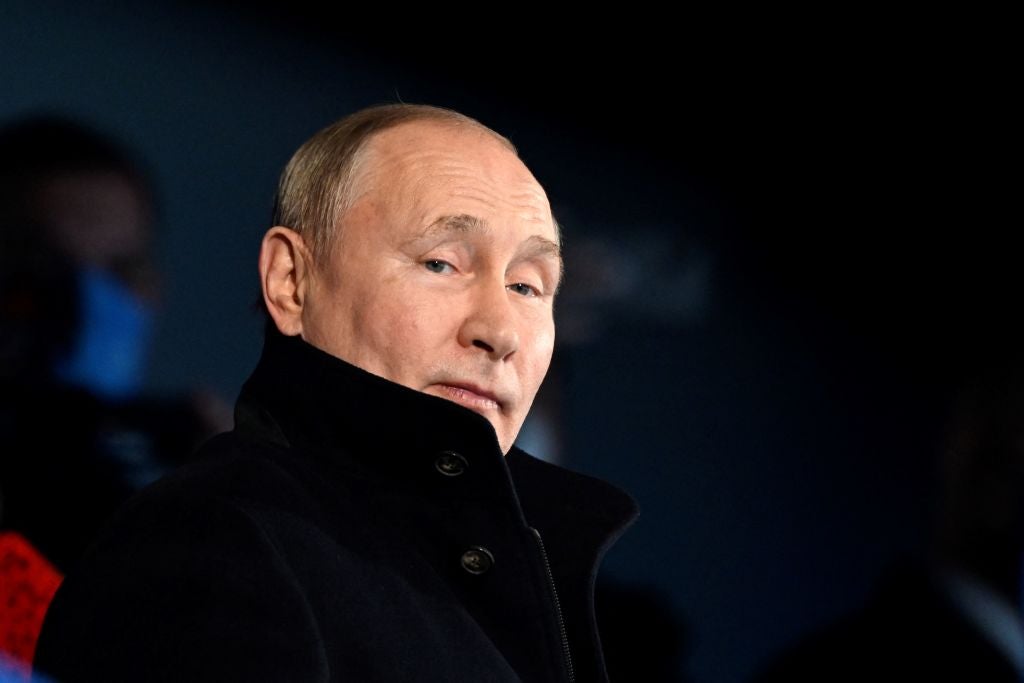Vladimir Putin must be given a way to back down without losing face
Editorial: The prime minister’s speech in Munich sought to emphasise the cost of invading Ukraine while seeking to give the Russian president a way out

Boris Johnson succeeded in rising to the level of events in his speech to the Munich security conference. Gone was the bluster and, thank goodness, the jokes. Instead, in a well-argued and direct address, he got to the heart of the dilemma facing the defenders of Ukrainian sovereignty.
“It is in our collective interest that Russia should ultimately fail and be seen to fail,” he said. A careful sentence, that. “Ultimately” is a way of tacitly accepting that a Russian invasion of Ukraine will not be resisted militarily by Ukraine’s allies. The strategy is to raise the cost to Vladimir Putin of invading, by arming the Ukrainians and by threatening economic sanctions.
This strategy depends on Russia failing in the long term to subjugate Ukraine. Mr Johnson seemed to accept that Mr Putin could “overrun” the country by “brute force”, but warned that he would be unable to bear the cost in resources and lives lost of a long guerrilla war, as Ukrainian grannies take up arms to resist.
If Mr Putin wants to integrate Ukraine and possibly Belarus into a greater Russia, he certainly seems doomed to fail in the long run. But it is still not clear that he intends to order a full invasion and occupation of Ukraine, despite repeated assertions by the US and British governments that he has already decided to do so. It seems more likely that he will continue to provoke conflict in Donetsk and Luhansk, the eastern regions of Ukraine, and use Russian military force to ensure their “autonomy” from Kiev, while waging a low-level war of intimidation against the Ukrainian government. Mr Putin’s aim may be simply to create such a weakened and ineffective administration in Kiev that the country becomes in effect a Russian vassal state.
Of course, it is just as important that he fails in such a venture as that he fails – ultimately – in any attempt to take over the whole country by force. It was significant, therefore, that Volodymyr Zelensky, the Ukrainian president, felt secure enough to attend the Munich conference. But how to ensure Mr Putin’s failure without further stoking Russian paranoia?
The most interesting part of the prime minister’s speech was the section in which he acknowledged that “there is a discussion to be had” with President Putin “about the threats that he claims to see”. Mr Johnson said these supposed threats “are the product of the Kremlin’s chronic but misguided view of Nato as a supposedly encircling and intimidating alliance”. Of course, as he said in his speech, sovereign nations must have the right to choose their alliances. He was right to point out, too, that it was only after Mr Putin invaded Crimea, part of Ukraine, in 2014 that Nato permanently stationed troops anywhere east of Germany.
However, Mr Johnson went further than simply asserting that “Nato is a peaceful and defensive alliance”, saying: “We are willing to work with President Putin to demonstrate that point and to give him the reassurances that he may need.”
Therein lies the dilemma, in that Mr Putin must “fail and be seen to fail” – but not too hard.
Join our commenting forum
Join thought-provoking conversations, follow other Independent readers and see their replies
Comments
Bookmark popover
Removed from bookmarks